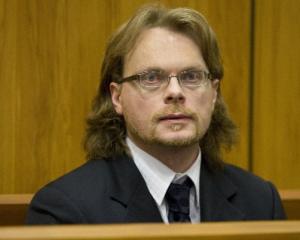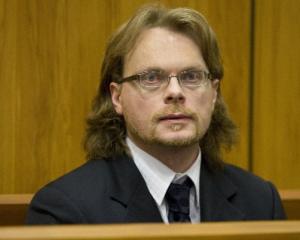He was surprised Clayton Weatherston (33), a former colleague charged with murdering Miss Elliott, had attributed such a comment to him, Prof Dorian Owen said.
And he "certainly did not say her [Miss Elliott's] boobs were hanging out during the presentation", he told Crown counsel Marie Grills.
Prof Owen was giving evidence on the 13th day of Weatherston's trial before Justice Judith Potter and a jury reduced to 11.
Weatherston denies murdering Miss Elliott (22) at her home on January 9, 2008, although he admits her manslaughter.
Weatherston gave evidence for two hours on Wednesday and for all of Thursday.
He was to have continued yesterday, but legal argument delayed the trial until the afternoon and the Crown agreed Prof Owen could give his evidence before Weatherston continued on Monday.
Prof Owen told the court he found Weatherston easy to get along with, but knew he was ultra competitive in his academic work.
There was some suspicion in the department he had chosen his subjects carefully to ensure his "amazing" A-plus academic record remained intact.
"My impression was he thought he was very good, but I didn't think he was arrogant about it."
He knew of Weatherston's dissatisfaction about the marking of his dissertation, but told him if he wanted to be an academic he would have to get used to taking criticism.
He also knew of the accused's disputes with others in the department over co-authorship and plagiarism.
He had told him it was not worth making a fuss; that if he did, it would be showing he was not an easy person to work with.
He had advised Weatherston against becoming involved with Miss Elliott and felt the accused had not fully thought through the consequences of such a relationship.
He thought it particularly unwise when Weatherston was applying for a lecturing position with the department.
Miss Elliott was an excellent student, very happy to talk in class, quite forceful in the way she thought and quite independent in her own study, Prof Owen said.
She was lively, dramatic and expressive, whereas Weatherston's former girlfriend had seemed to be a fairly calm person.
From what the accused told him at times, he was aware of difficulties in the relationship with Miss Elliott towards the end of 2007.
Although she was attractive and very bright, Weatherston said she was always needing reassurance about her appearance and her ability.
Prof Owen said he knew Miss Elliott went to Australia on holiday in November.
His impression was Weatherston was relieved and wanted out of the relationship.
He also knew Miss Elliott was going to Wellington to a Treasury job and he thought that would be a natural ending.
When Prof Owen met Weatherston early in January, the accused said he had told Miss Elliott they had no future together.
Weatherston told the witness the relationship was over and he had a new girlfriend.
Weatherston also told him of an incident when Miss Elliott had smashed a door and about changes she had made to her Facebook.
Weatherston thought she was trying to make him jealous.
He said she claimed he had been physically abusive, and she had struck him and said, "Now we're even."
Weatherston said Miss Elliott had told her mother he tried to rape her and he said that was not true.
"I told him to keep his head down; she'd be leaving soon; everyone knew she was going and it was best to leave her alone," Prof Owen said.
Weatherston said he was concerned Miss Elliott was not behaving in a sensible way and "that reinforced my view he should keep his head down", the witness said.
He agreed his impression was Weatherston liked to have the last word, that he liked to be in control.
When the accused asked what his chances were of getting the lecturing job, Prof Owen said he told him he thought the disputes with other staff and the relationship with Miss Elliott were negative matters.
Weatherston was concerned the relationship with her would have negative connotations because he believed she had discussed him with her course supervisor.



